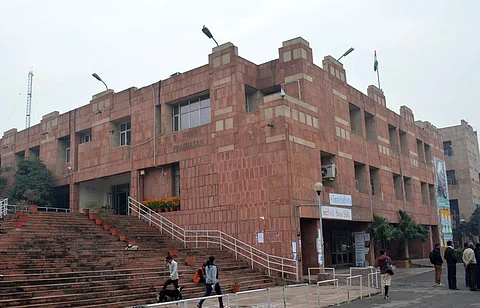

Protests in Jawaharlal Nehru University (JNU) are still aplenty, this time by the contractual workers inside the campus. The workers have decided to boycott work and hold a sit-in protest at the Dean of Students’ office. On May 4, the Dean of Students of JNU, Sudheer Pratap Singh, informed the workers that the JNU administration had decided to assign duties to them on a rotation basis and reduce the workforce in each shift of the rotation. This spread discontent and anger among the workers, who were already miffed with the administration because of the non-payment of their dues, as reported by Sucheta De, the former JNUSU (JNU Students' Union) President and current National Vice-President of AICCTU (All India Central Council of Trade Unions).
The move principally affects the mess and sanitation workers. In an interview with EdexLive, Sucheta says, “The protest started on May 4 itself, the day the workers were told about the administration’s decision. The main issue was the non-payment of dues. It has been going on for the last few years that the workers are not being paid their wages for 3-4 months at a stretch. Despite several intimations to the administration, there has been no response or compliance from them.”
It has been alleged that the decision of the administration goes against the 2018 Order of the Office of Deputy Central Labour Commissioner. “We have been demanding equal pay for equal work,” Sucheta adds, meaning that the contractual workers have been demanding equal payment as is given to the permanent workers for the same work. However, she says that this has not happened and “the administration is sitting on crores of rupees, which rightfully belongs to the workers”. The All India General Kamgar Union (affiliated to AICCTU), which is the union of contractual workers at JNU, had also reported the matter to the labour commissioner.
The workers had addressed a letter in Hindi to Vice-Chancellor Santishree Dhulipudi Pandit as well, highlighting their concerns. “There have been continuous reductions in the workforce since 2020. When the amount of work remains the same, then the reduction in the workforce is a violation of the Contract Labour Regulation and Abolition Act and the Industrial Dispute Act,” reads a section of the letter.
Breaking it down for us, Sucheta explains, “There are two things that will happen if the workforce is reduced. It means retrenchment by the JNU administration and it will mean more work for the workers. The decision to assign work on rotation also means further reduction in workforce. It will also mean that a worker has no guarantee of getting 26 days of work per month, according to the contract.” She laments that the JNU administration has not responded to the ongoing protests. “The Dean of Students said he could not do anything. It is the company,” Sucheta states, flabbergasted.
In a press release that was shared with Edexlive, it has been claimed by AICCTU that the company is seeking profits by reducing the workforce and the JNU administration is supporting this move. It was also alleged by AICCTU that as the agitation continued, on May 5, a group of mess workers had been locked inside the kitchen and forced to work. Sucheta said that nothing could be done about the matter as nobody would take action against the JNU administration. On May 6, an order was issued by the JNU administration, prohibiting Sucheta from entering the university campus. Sucheta proclaims this order to be “arbitrary and illegal”.
“The workers have decided to sit in protest until there is a detailed written assurance from the JNU administration satisfying their demands,” Sucheta says. In another press release that was shared with Edexlive, the workers have demanded the reinstatement of all the workers, the payment of their dues and the revocation of the decision to base the work on rotation and reduce the workforce.
As to the administration’s response to the protests, Sucheta says that, so far, nothing has been done to address the workers and their woes. “When the protests started, the administration paid a month’s salary to the workers. But the salary had not been paid for three months, so two months’ salary is still pending. They have also said that they are assigning duties to the workers in the hostels. But there is no assurance that this will ensure the workers 26 days of work a month,” she explains.
